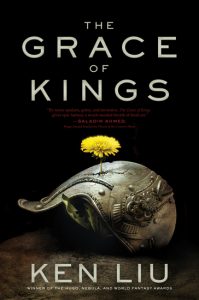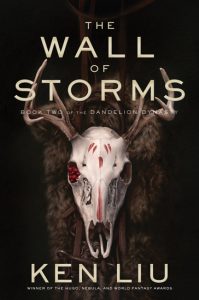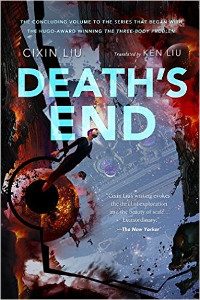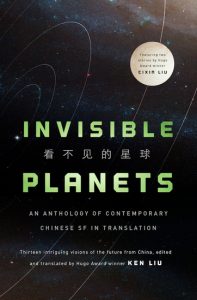 Ken Liu is an author and translator of speculative fiction, as well as a lawyer and programmer. A winner of the Nebula, Hugo, and World Fantasy awards, he has been published in The Magazine of Fantasy & Science Fiction, Asimov’s, Analog, Clarkesworld, Lightspeed, and Strange Horizons, among other places.
Ken Liu is an author and translator of speculative fiction, as well as a lawyer and programmer. A winner of the Nebula, Hugo, and World Fantasy awards, he has been published in The Magazine of Fantasy & Science Fiction, Asimov’s, Analog, Clarkesworld, Lightspeed, and Strange Horizons, among other places.
Ken’s debut novel, The Grace of Kings (2015), is the first volume in a silkpunk epic fantasy series, The Dandelion Dynasty. It won the Locus Best First Novel Award and was a Nebula finalist. He has a collection of short fiction, The Paper Menagerie and Other Stories (2016). He lives with his family near Boston, Massachusetts.
In addition to his original fiction, Ken is also the translator of numerous literary and genre works from Chinese to English. His translation of The Three-Body Problem, by Liu Cixin, won the Hugo Award for Best Novel in 2015, the first translated novel ever to receive that honor.
Rachel Cordasco: You are one of the most prolific writers/translators I’ve ever encountered! How do you balance your own writing and translating fiction from Chinese?
Ken Liu: I get tagged as “prolific” often, which baffles me. I write slower than most writers I know, and I don’t keep a daily wordcount. I suspect this reputation has more to do with the fact that I wrote for almost a decade before being published regularly, and so the illusion of being a very fast writer is simply the result of publishing stories accumulated over a long time within a short period.
It’s the same with my translations. I translated the novels in the Three-Body series and other works over many years. That they came out within a short time doesn’t mean I did the translation within that timeframe.
As for balance, it hasn’t really been an issue. I accept very few translation commissions and turn down most invitations to write short fiction. For my own fiction, I try to pick themes where I think I can give them a unique spin. And I only translate works where I think my particular skills and translation approach will be beneficial.
RC: When and why did you first become interested in literary translation?
KL: I got into translation purely by accident. My friend Chen Qiufan (a.k.a. Stanley Chan) had one of his stories translated professionally, and then asked me to take a look at the result. I started to make a few suggestions, but then told Stan that I thought it would be easier if I just did the translation from scratch. That story, “The Fish of Lijiang,” ended up winning the SFF Translation Award.
After that, I also got to work with Pathlight magazine, the English publication of People’s Literature, China’s most prestigious literary journal. Among other stories I translated for them, I particularly enjoyed Xue Yiwei’s “Taxi Driver,” one of the most beautiful stories I’ve ever read.
And the novels basically followed as commissions from the authors/publishers based largely on my reputation in the literary and SFF translation world.
RC: Your translations of Liu Cixin’s Three-Body Problem and Death’s End, as well as the many short-story translations you’ve published in Clarkesworld, Pathlight, F&SF, Tor.com, and elsewhere, have introduced many English-language readers to Chinese sci-fi. Who else are you excited to translate?
KL: I have to be cautious here, because the nature of the power imbalance between the culture of the United States and the culture of China, and between contemporary English and Chinese, impinges on every potentially innocuous answer. Because there are many English works translated into Chinese every year but few Chinese works translated into English, and because there are many skilled English->Chinese translators but far fewer skilled Chinese->English translators, the net effect is that some translators of renown, especially in literary fiction, where the economy of prestige matters a great deal, have become gatekeepers and tastemakers, wield an enormous amount of power over their authors and their words, and shape the perception of the anglophone readership of Chinese fiction even more than Chinese authors. I think it’s a deeply problematic dynamic.
It’s only recently, after looking more closely at the way power is accumulated and exercised in the field of literary fiction translation, that I’ve come to appreciate the complexity of the issues. To be sure, SFF translation is different and I’m a nobody, but I still feel it is best for me to avoid ever giving anyone the impression that I’m being in a position of power in that respect.
So, rather than giving out my personal literary opinion on what I’m excited about—which may be misunderstood as what is worth translating—let me say that I strive to promote/train other translators so that we have many Chinese->English channels rather than a few; I try to seek out writers and works that speak to me personally; and I do whatever I can to always center the author over the translator so as to avoid recreating the problematic power dynamics I’ve seen in literary translations.
RC: What are some of the hallmarks/tropes/concerns of Chinese sci-fi?
KL: I get asked this question a lot, and I always point out that the question cannot be answered in a way that is satisfactory to those who want a real answer.
Suppose you were to ask a hundred American SFF authors to name some of the hallmarks/tropes/concerns of “American sci-fi,” you would surely get back a hundred different sets of answers. Every author has her own concerns, politics, identities, obsessions, and interpretations for what it means to be “American” and what makes a work “scifi” — and thus the scifi written by each individual American author will be distinct.
Chinese scifi, insofar as that category has meaning, is just as contested, diverse, idiosyncratic, personal, political, and resistant to generalization. China is a society that is undergoing tumultuous changes — in a few decades China has experienced the same kinds of transformations that took other states centuries. It is at once one of the most unequal societies on Earth as well as one of the most innovative, a place where postmodern political consciousnesses and protest identities co-exist with 19th-century-style oppression. It is impossible for anyone, even those who consider themselves part of the Chinese SF community, to reduce Chinese scifi to easy generalizations.
That doesn’t mean you won’t see a lot of statements like “Chinese scifi is/isn’t <blank>” around the Web. For the most part, they’re made by people who have no idea what they’re talking about. As a general rule, the more confident someone can tell you what Chinese scifi is “about,” the less you should listen to them.
RC: Any current/future projects you’d like to tell us about?
KL: I do have a lot of fun projects going on right now:
I’m drafting the third and final volume in my silkpunk trilogy (The Grace of Kings (2015) and The Wall of Storms (October 2016) are the first two entries), which is hard work but also very rewarding.
Speaking of the trilogy, the second book in my series, The Wall of Storms, is going to be released on October 4, and I’m super excited. There are lots more intrigue and politics and crafty battle strategies and oodles of silkpunk technology. And the two protagonists, a princess-engineer and a scholar-engineer who Get Things Done, have existed in the plan for the series since day one — it’s finally time to introduce them to the world.
And as you know, my translation of the final volume in Liu Cixin’s Three-Body trilogy, Death’s End, will be out in September. This is my favorite volume in the series, so fans of the first two books are in for a treat.
In November, Tor Books will publish my collection of translations of contemporary short-form Chinese SF, Invisible Planets. This book will contain award-winning stories by such luminaries of the Chinese SF world as Liu Cixin, Chen Qiufan, Xia Jia, Hao Jingfang, and others.
Finally, I’m also working on two more translations: Three-Body X, a novel set in Liu Cixin’s Three-Body world written by award-winning author Baoshu, and The Waste Tide, a post-cyberpunk thriller that also happens to be Chen Qiufan’s debut novel. Hopefully readers will get to see these in print soon.
Thanks so much to Ken for this interview!




